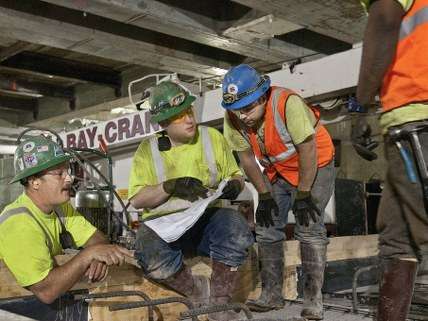Are Jobs Returning Because Extended Unemployment Benefits Ended?

We're seeing a (somewhat) improving job market in 2014, with the official unemployment rate finally dipping below 6 percent last month for the first time since 2008. Is the economy finally improving? Or could it be that our own federal government kept hiring at an anemic level with its own policies, essentially taking a baseball bat to the kneecaps of the job market? Three economic analysts with the Federal Reserve Bank of New York argue that Emergency Unemployment Compensation, implemented as a temporary measure in 2008, extended several times by Congress, and finally expired at the end of 2013, deserves much of the blame for limping job prospects over the past few years. They say its expiration can be thanked for new "help wanted" listings.
As authors Fatih Karahan, Samuel Kapon, and Kaivan K. Sattar note in "Do Unemployment Benefits Expirations Help Explain the Surge in Job Openings?"
Preexisting legislation provided for up to twenty-six weeks of UI and, in states with a high unemployment rate, the Extended Benefits (EB) program provided twenty additional weeks. EUC started by allowing for an extra thirteen weeks of benefits to all states and was gradually expanded to four tiers, providing up to fifty-three additional weeks of federally financed benefits. This extension increased the maximum duration to an unprecedented ninety-nine weeks.
The very extended unemployment insurance was meant to provide a cushion for people thrown out of work by the Great Recession. That's an easy sell when the economy is lousy, and when job listings look awfully sparse. As that sparsity continued, it was easy to persuade lawmakers to renew extended benefits again, and again. But what happens when you do that, write Karahan, Kapon, and Sattar, is that "increases in UI generosity put upward pressure on wages since it becomes more expensive to lure people into work. As a consequence, firms anticipate lower profits and cut back job creation, which lowers the job finding rate and increases the unemployment rate."
So, you create a cycle of suckage as labor becomes too expensive for business to hire, even as it's not being put to use, and that kills job potential openings which…
This shouldn't have been a surprise, argue the authors, since the Nobel Prize in Economics was awarded in 2010 for the development of the Diamond-Mortensen-Pissarides model, predicting exactly such a perverse effect.
In our real world test for Diamond-Mortensen-Pissarides, the expiration of Emergency Unemployment Compensation at the end of 2013 finally provided an opening for the job market to recover. "EUC expiration raised the job openings rate by 0.6 percentage point to 3.4 percent," the authors argue, "remarkably close to the realized rate in the Job Openings and Labor Turnover Survey (JOLTS) report of 3.3 percent for June 2014."
Recovery was delayed until then, they say, by continuing debates in Congress over renewing EUC. Once the possibility died, the jobs revived.
You see, government programs really do help the economy. When they go away.


Show Comments (90)